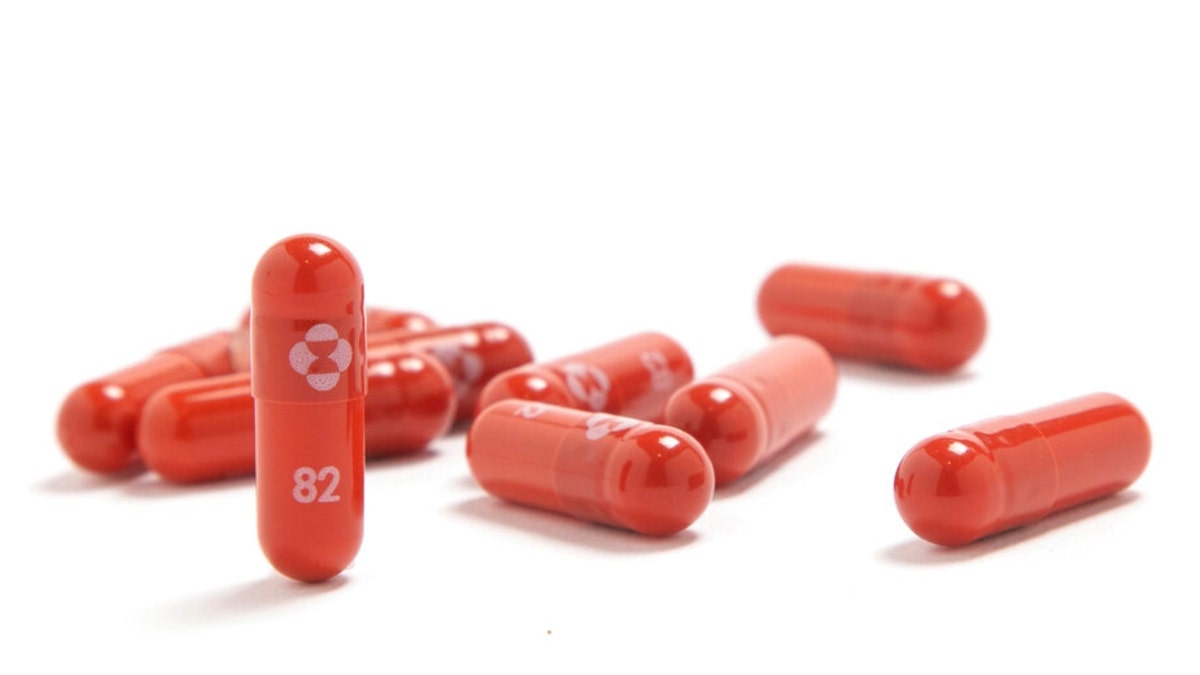Fox News Flash top headlines for December 14
Fox News Flash top headlines are here. Check out what's clicking on Foxnews.com.
While the Food and Drug Administration (FDA) is expected to soon rule on whether to authorize Merck's COVID-19 pill, questions remain regarding its risks in pregnant women.
The pill was submitted to regulators several weeks ago and would be one of the first COVID-19 treatments – along with a competing pill from Pfizer – that could be picked up at a U.S. pharmacy and taken home.
MERCK COVID-19 PILL: FDA PANEL WEIGHS SAFETY, EFFECTIVENESS
In a November meeting, government health advisers weighed information that the drug, known as molnupiravir, was less effective than first reported and could cause birth defects – in addition to whether or not it could potentially even cause mutations in human DNA.
Children and pregnant women were not included in trials and Merck did not study the drug in fully vaccinated people. Merck said its own studies found no evidence that the drug causes DNA mutations.
Animal studies showed the drug had caused toxicity and FDA staffers concluded the data "suggest that molnupiravir may cause fetal harm when administered to pregnant individuals."

FILE - This undated file image provided by Merck & Co. shows their new antiviral medication molnupiravir. An experimental COVID-19 drug that could soon become the first U.S.-authorized pill to treat the coronavirus faces one final hurdle Tuesday: A panel of government experts will scrutinize data on the medication from drugmaker Merck. (Merck & Co. via AP, File)
Merck said it would not recommend the drug be used in women who are pregnant or lactating, but was opposed to a blanket restriction on prescribing to those patients.
The antimicrobial drugs advisory committee voted to recommend its use, contending that potential benefits of Merck's COVID-19 pill outweighed its risks.
Molnupiravir works best when given within five days of initial symptoms of COVID-19 and Merck tested the drug in adults with mild-to-moderate COVID-19 who were considered higher risk due to health problems like obesity, diabetes or heart disease.
Merck said that its pill reduced hospitalizations and deaths by 30% in high-risk adults.
The FDA said the company agreed the drug would not be used in children.
It is already authorized for emergency use in the U.K., excluding pregnant and breastfeeding women.
MERCK'S COVID-19 PILL COULD CARRY SERIOUS SAFETY CONCERNS, SCIENTISTS WARN
Now, weeks later, the FDA is still weighing Merck's application.
According to The New York Times, University of North Carolina at Chapel Hill H.I.V. researcher Ronald Swanstrom – who helped lead a study of molnupiravir in isolated hamster cells and reportedly found that the drug did induce mutations in DNA – said he does not believe "anybody knows what this dose means in terms of human outcomes."
In a letter objecting to Swanstrom’s conclusions, Merck scientists said that hamster cells were exposed to the drug for considerably longer than COVID-19 patients would be and that it had found no signs of mutagenicity.
"We see this molecule as having a very low risk for mutagenicity," Dr. Roy Baynes, Merck’s chief medical officer, countered in an interview with the newspaper. "This drug is used for five days, and the goal is to eradicate the virus quickly and this is not a long-term treatment."
Swanstrom noted that he had struggled over whether to speak up regarding what the paper said were "largely theoretical" concerns.
"If the risk is really trivial, then it would be a bad mistake not to give it," Swanstrom said, according to the TImes.
The Times said that scientists have called on Merck to publish the full findings of its rodent studies examining the risk of DNA mutations or to allow long-term molnupiravir outcomes to be studied – regulators noted in November that Merck had collected far less safety data overall on its drug than was gathered for other COVID-19 therapies – and Merck executives told the advisory committee that the company would set up a surveillance program to monitor women who take molnupiravir during pregnancy, even if the drug is not formally authorized for that group.
Merck did not return Fox News' request for comment.
CLICK HERE TO GET THE FOX NEWS APP
Both Merck and Pfizer's pills are expected to perform well against the omicron variant.
The U.S. government has agreed to purchase enough of Pfizer’s drug to treat 10 million people and enough of Merck’s to treat 3 million, pending FDA authorization.
The Associated Press contributed to this report.



